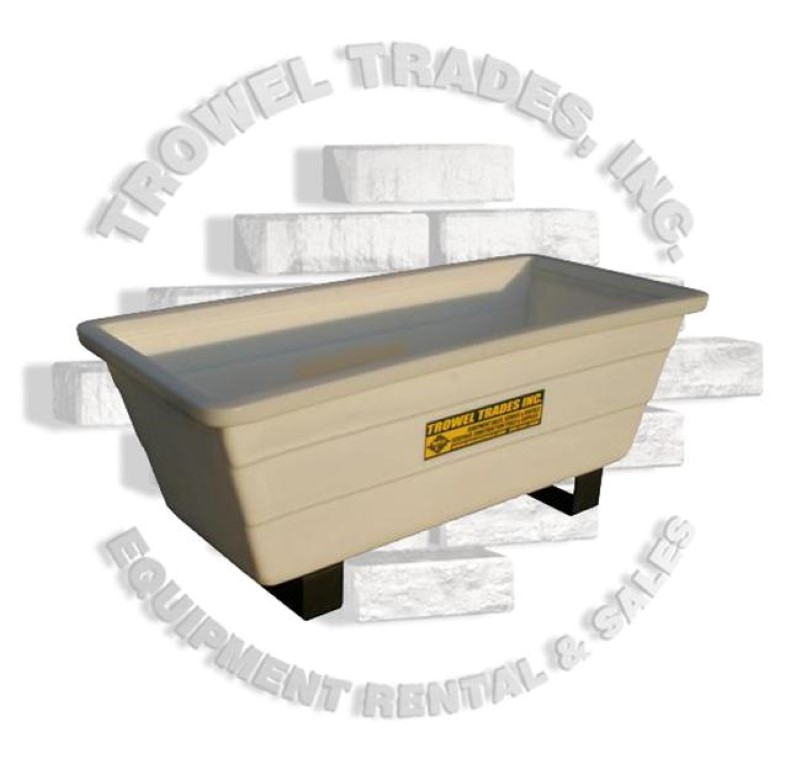
FREE SHIPPING ON
ALL QUALIFYING ORDERS
Enter your email below to join our mailing list:

By Todd Ferguson
Driving past or working on just about any construction site in the United States, what will you usually see on the other side of the fence? If the project involves masonry construction, it’s a safe bet you’ll see the familiar, big white silo and orange mortar mixer together on the job. It is a classic combo, like burgers and fries or thunder and lightning. This is a popular way to store and mix mortars and grouts on the job, but by no means is it the only configuration that is possible.
The silo system is often provided with pre-blended bulk bags of masonry materials. Although a silo mixer seems like a large piece of equipment, it only takes up a small area – about 8 X 8 feet. This small footprint makes the silo an ideal choice for work in concentrated urban areas or any project with space limitations. Silos are used on large commercial jobs and smaller jobs as well.
Benefits of silo systems can apply to any size job if contractors have a telehandler or large skid steer to load material. Contactors load these silos with bulk bags of masonry materials pre-mixed to specific compressive strengths. They are available in capacities from 15 tons (10 super sacks) to 36 tons. Some designs are fully enclosed to help keep material dry and reduce freezing in cold climates. Silos, as opposed to batching by hand or other manual processes, reduce a lot of material waste. Batching by hand with bulk sands and cements is not nearly as efficient, since some materials are left on the ground when shoveling and transferring from piles to masonry mixers. Use of silos with pre-made dry masonry materials ensures the consistency of the mix design while reducing contractor liability for batching to the right compressive strength.

Shown is a continuous mixer.
The most common mixers used with the silos have a range of power options and capacities. You will often see the larger capacity mixers with standard gasoline engines used in the United States. Traditional mortar mixers that you would see pulled behind a truck by a mason are in the 6- to 8-cubic-foot range. But, under a silo system, the larger 12-cubic-foot capacity or larger mixers are most common. These mixers will have telescoping legs to offer the versatility of variable dumping or loading heights. They offer the ability to mix larger aggregates in the concrete or grout than the typical mortar mixer. Contractors can process up to 1-inch aggregates in the material, which is more than the typical ½-inch aggregates used in coarse masonry grouts. Controlling water content is easy, especially with optional water bars and water meters available from the manufacturers.
The silo and mixer combination is great for storing bulk masonry materials and mixing on site. You can mix mortar and deliver it to a trough or delivery system, but what if you want a configuration to mix and pump on the jobsite?
Take that same silo and mixer and try to dump into a grout pump, and you may have a challenge on your hands. The mixers are typically used at a low leg setting under the silo. But when loading into a grout or concrete pump, the telescoping legs would have to be raised on the mixer to allow the mixer to dump into the pump hopper. No problem, right? But what about clearance under the silo? Now the silo may have to be raised up as well to let the mixer dump into the pump. It is possible, but another configuration of the silo offers a simpler solution: combining silo with a continuous mixer. This type of mixer attaches to the common 10-bag capacity silo system and features a highly advanced auger mechanism with paddles and agitators to ensure thorough mixing of the pre-blended materials.
Hydration is controlled by connecting a pressurized water source with a common 1-inch hose and standard GHT connection. Or, if only water tanks are available on the job, the mixer offers a means of siphoning water from the water tank. In addition, the output of the mixers range from 3 to 7 cubic yards per hour, making the mixer higher in production than a mortar mixer.
Comparing the max capacity of the largest mortar mixer to the continuous mixer output reveals the difference in output. We have to remember that bag capacity is more important than the mortar mixer drum capacity in cubic feet or yards. The largest mortar mixers have up to seven bags capacity. Based on an 80-pound bag of core fill grout, that comes out to about 6 cubic feet.

The largest mortar mixers have up to seven bags capacity, so based on an 80-pound bag of core fill grout, that comes out to about 6 cubic feet.
Assume we can make four batches in that mixer per hour, and you have just under 1 yard per hour of production. By contrast the continuous mixer outputs 3 to 7 cubic yards per hour. The continuous mixer is faster and even allows coarse aggregates in the mix. Best of all, the continuous mixer provides a direct link between the dry material and the concrete pump. Clearance height is no longer an issue, because the continuous mixer has a very narrow profile and connects directly to the bottom discharge of the silo at a perfect height to pour into any concrete pump.
Contractors can select the concrete pump/grout pump that provides the compatible output for the continuous mixer. There is no need to back in a large 50-yard concrete line pump under the continuous mixer; it has output far beyond what the continuous mixer can handle. Instead, masonry grout pumps are available in the same output range as the mixer, at about 10 yards per hour. Manufacturers design these pumps to handle aggregates in the mix even larger than the typical ½ inch used in coarse grouts. Also, consider the mobility of the pump and choose a design with self-propelled movement, so that the pump can be positioned on the jobsite with minimal effort. You don’t want to have to hook up a trailer pump to a pickup truck or to a forklift every time it needs to be moved.
By considering the end goal of moving grout/and or mortar most efficiently to the masonry units, contractors can then trace the process backward and determine each link in the masonry materials material delivery “chain.” Using the silo configuration described here will allow contractors to take material from a dry state, mix it with water and then deliver the material to where it is needed on the jobsite using only a silo, continuous mixer and pump, or three “links in the chain” from dry material to application.
Todd Ferguson is International Product Manager for Cincinnati, Ohio-based Airplaco Equipment Co.





No spam, notifications only about products and updates.

Having dealt with MK Diamond Products and the Delahauts since the mid 1990’s it is sad to hear the news that they have closed their

I’ve told my wife and daughter to never follow a mortar mixer down the interstate. For over 30 years we have sold, rented, and repaired

This question is one of the most frequent mixer related questions our rental staff are asked. Our contractor customers know the importance of using the right tools for the job.

Trowel Trades, a company that specializes in equipment rental, tool retail, repair services, scaffolding and mast climber access solutions, enters the Silver Tier of the Masonry Alliance Program.
Your email was submitted successfully.
YOUR 10% OFF COUPON CODE IS WELCOME10.
See category exclusions below.
Category Exclusions:
Arbortech Brick and Mortar Saw, Compaction, Concrete Mixers, Concrete Walk Behind Saws, Drop Hammers, Grout Hogs, iQ Power Tools, Masonry Block Saws, Masonry Brick Saws, Mast Climbers, Mortar Mixers, Mud Buggy, Saws, Scaffold, Self Dumping Hoppers, Shoring, and Stihl